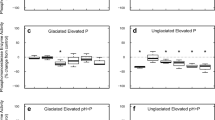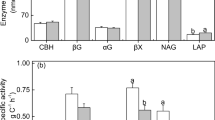Abstract
Phosphorus mineralization and microbial biomass were measured in the surface 5 cm of a Spodosol (sandy, siliceous hyperthermic Ultic Alaquod) from north-central Florida. Soils from fertilized and unfertilized plantations of loblolly pine (Pinus taeda L.) were incubated at a range of water potentials (∼0, –3, –8, –10 and –1500 kPa) and temperatures (15 °C, 25 °C and 38 °C) for 14 days and 42 days. Increasing water potential and temperature increased specific P mineralization (mineralization expressed as a percentage of total P) regardless of fertilizer treatment. An increase in water potential from –10 kPa to –0.1 kPa resulted in an increase of between 38% and 239% in the concentration of KCl-extractable inorganic P, depending on incubation temperature and time. An increase in incubation temperature from 15 °C to 38 °C resulted in an increase of between 13% and 53% in KCl-extractable inorganic P. Changes in specific P mineralization with change in water potential or temperature were not affected by fertilizer application. This suggests that, although specific P mineralization was greater in the fertilized soils, environmental control of P mineralization was the same for both treatments. Specific P mineralization was most sensitive when soils were at higher water potentials, and decreased logarithmically to water potentials of between –3 kPa and –8 kPa. Specific P mineralization was relatively insensitive to changes in water potential when water potential was lower than –8 kPa. Microbial biomass C showed no consistent responses to changes of temperature or water potential and was not significantly correlated with specific P mineralization. Our results suggest that field estimates of P mineralization in these Spodosols may be improved by accounting for changes in soil water potential and temperature.
Similar content being viewed by others
Author information
Authors and Affiliations
Additional information
Received: 30 October 1997
Rights and permissions
About this article
Cite this article
Grierson, P., Comerford, N. & Jokela, E. Phosphorus mineralization and microbial biomass in a Florida Spodosol: effects of water potential, temperature and fertilizer application. Biol Fertil Soils 28, 244–252 (1999). https://doi.org/10.1007/s003740050489
Issue Date:
DOI: https://doi.org/10.1007/s003740050489




